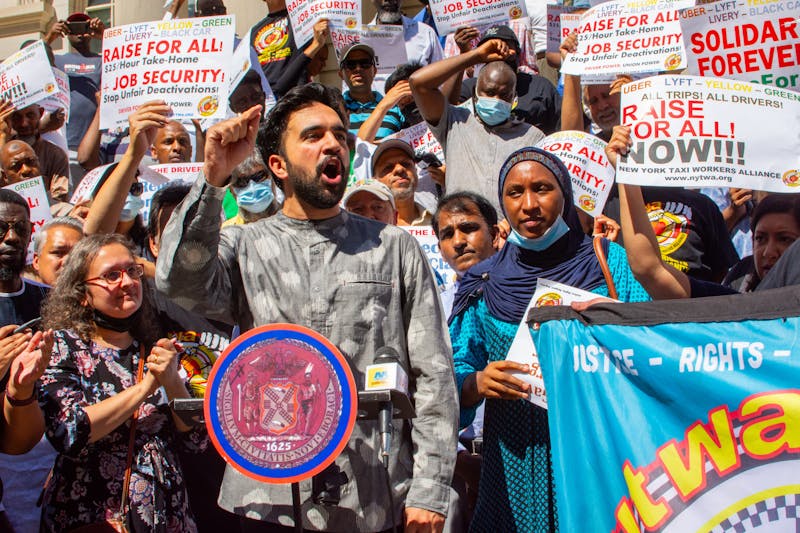Science
Mamdani’s Mayoral Victory Sparks Hope for Disillusioned New Yorkers

The recent election of Zohran Kwame Mamdani as the mayor of New York City has stirred optimism among residents disillusioned with traditional political dynamics. On November 16, 2025, Mamdani, a self-identified Democratic-Socialist and the son of Ugandan immigrants, won the mayoral primary, marking a significant shift in the political landscape of America’s largest city. His victory resonates particularly with marginalized communities seeking representation and a renewed focus on pressing social issues.
Mamdani’s campaign captured the essence of New York City’s diversity. Nearly 37% of the city’s residents were born outside the United States, and 49% speak a language other than English at home. His outreach included translating campaign materials into various languages and engaging directly with immigrant communities. By visiting taxi drivers at LaGuardia Airport and local business owners, Mamdani aimed to establish a connection that transcended the typical political narrative.
As New Yorkers grapple with escalating living costs, Mamdani’s platform directly addresses the housing crisis. By April 2025, the average monthly rent in New York City reached approximately $3,966, significantly higher than the national average of $1,625. His proposals include building 200,000 new rent-stabilized homes over the next decade and implementing a freeze on rents for the two million rent-stabilized apartments. In contrast, the outgoing mayor Eric Adams approved a 12.6% increase on stabilized rents, highlighting the urgent need for Mamdani’s bold reforms.
In addition to affordable housing, Mamdani’s campaign emphasizes social equity through initiatives like city-owned grocery stores, fare-free public transportation, and free childcare services. His affordability calculator estimates that families could save up to $45,960 annually under his proposed policies, positioning him as a candidate committed to tangible improvements in residents’ lives.
Mamdani’s stance on international issues has also set him apart from his predecessors. He has condemned the actions of the Israeli government in Gaza, advocating for an end to the New York City-Israel Economic Council established by Adams. By separating anti-Zionism from antisemitism, he pledges to hold Israel accountable while also committing to combat antisemitism and protect Jewish communities in New York.
Despite his progressive platform, Mamdani faced significant opposition during the campaign. Former New York governor Andrew Cuomo and Republican nominee Curtis Sliwa attempted to undermine his candidacy through racially charged rhetoric, labeling him a “terrorist sympathizer” and suggesting he posed a threat to the city’s Jewish population. Such attacks underscore the challenges faced by candidates from diverse backgrounds in navigating a politically charged environment.
Mamdani’s resilience in the face of adversity has resonated with many New Yorkers, particularly among the city’s Muslim community. His willingness to embrace his identity and share the experiences of Muslims in the city has fostered a sense of hope. For many, his victory signals a break from the past, where representation often felt tokenistic or superficial.
Growing up in New York City, the impact of events like the September 11 attacks and subsequent Islamophobia has deeply influenced perceptions of Muslim identity in politics. Mamdani’s election represents a shift towards acceptance and visibility, empowering individuals to express their identity without fear of stigma.
As Mamdani prepares to take office, his win is being viewed as a potential turning point for American politics. His approach to governance, characterized by authenticity and a commitment to community engagement, offers a refreshing alternative to the traditional political establishment. For those who have felt marginalized by the system, Mamdani’s administration signals a new era—one where voices from all backgrounds can aspire to influence the future of their city.
In conclusion, the election of Zohran Kwame Mamdani as mayor of New York City serves as a beacon of hope for many disillusioned voters. His focus on housing affordability, social equity, and genuine representation may not only reshape the political landscape of New York but also inspire a broader movement for change across the United States.
-

 Science1 month ago
Science1 month agoIROS 2025 to Showcase Cutting-Edge Robotics Innovations in China
-

 Science2 weeks ago
Science2 weeks agoUniversity of Hawaiʻi at Mānoa Joins $25.6M AI Initiative for Disaster Monitoring
-

 Lifestyle1 month ago
Lifestyle1 month agoStone Island’s Logo Worn by Extremists Sparks Brand Dilemma
-

 Health1 month ago
Health1 month agoStartup Liberate Bio Secures $31 Million for Next-Gen Therapies
-

 World1 month ago
World1 month agoBravo Company Veterans Honored with Bronze Medals After 56 Years
-

 Lifestyle1 month ago
Lifestyle1 month agoMary Morgan Jackson Crowned Little Miss National Peanut Festival 2025
-

 Politics1 month ago
Politics1 month agoJudge Considers Dismissal of Chelsea Housing Case Citing AI Flaws
-

 Health1 month ago
Health1 month agoTop Hyaluronic Acid Serums for Radiant Skin in 2025
-

 Science1 month ago
Science1 month agoArizona State University Transforms Programming Education Approach
-

 Sports1 month ago
Sports1 month agoYamamoto’s Mastery Leads Dodgers to 5-1 Victory in NLCS Game 2
-

 Top Stories1 month ago
Top Stories1 month agoIndonesia Suspends 27,000 Bank Accounts in Online Gambling Crackdown
-

 Sports1 month ago
Sports1 month agoMel Kiper Jr. Reveals Top 25 Prospects for 2026 NFL Draft








